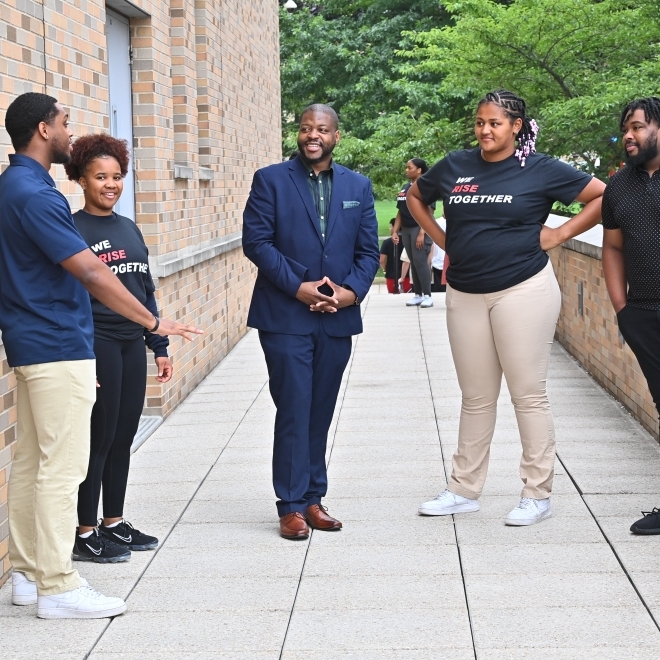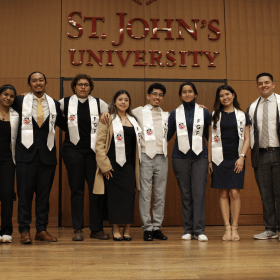Career Mentoring for College Students: What to Expect & How to Find a Mentor

Do you ever feel lost when it comes to planning your career? Imagine having someone who has already been through the same experience and is happy to share their knowledge with you. They can guide you, answer your questions, and support you—that’s the power of mentorship.
In this blog post, we dive into the benefits of having a mentor for career development and equip you with the knowledge and tools to embark on your mentorship journey.
What is Career Mentorship?
Career mentorship occurs when an individual who typically has more experience or knowledge in a particular area uses that expertise to provide valuable advice and support. Mentors can be incredible role models who share their stories, skills, and knowledge to help you grow and develop.
Top Benefits of Mentorship for Professional Development
Mentorship is a powerful tool that can assist you in achieving your career aspirations. Here are the top advantages and how it can aid you in unlocking your full potential:
Expand your professional network.
Mentors often have connections to industry professionals and can introduce mentees to expand their network.
Define your career path/goals.
A mentor provides guidance, advice, and support as you navigate the landscape of your chosen field. They often share their experiences and insights, helping you better understand the challenges and opportunities.
Gain career clarity.
A mentor has already been through the ups and downs of a specific career and can offer guidance and advice based on their own experiences. Additionally, a mentor can help you understand the nuances of a job, industry, or role that might be difficult to grasp just by reading about it.
Learn from their real-world experiences.
Mentorship is one of the most effective ways to gain unbiased and practical insights into a career path. Since mentors are typically experienced professionals, they are better equipped to provide you with a realistic picture of what it takes to succeed in your chosen field.
Grow personally and professionally.
A good mentor can provide valuable insights, feedback, and support to help you grow personally and professionally. Additionally, mentorship can help you build confidence, improve your communication skills, and expand your network.
Gain job satisfaction.
The guidance offered by mentors within a workplace can help you feel valued and appreciated, boosting your confidence and motivation. Additionally, having a trusted adviser to turn to for advice and feedback can help you feel more empowered and engaged in your work.
Related: Read the blog post Career Success Starts Here: Maximizing Your College Career Services.
How to Choose a Career Mentor
Looking for a mentor to guide you in your professional journey can be a challenging task, but it is achievable. With the correct approach, you can quickly identify an ideal mentor to help you navigate your field’s challenges and opportunities. This section explores the qualities that make a good mentor and suggests ways you can find one.
The Qualities of a Mentor
Mentors should
- Actively listen and provide constructive feedback.
- Be able to understand your strengths and weaknesses.
- Be approachable, empathetic, and patient.
- Be able to provide you with valuable insights and perspectives.
- Be passionate about your growth and willing to go above and beyond to support you in achieving your professional goals.
What to Discuss with a Career Mentor
Knowing what kind of support you need is essential when finding a mentor; consider where you are in your career journey and what you want to achieve.
Here are some examples of career topics to explore:
- Career advancement planning
- Career switching
- Industry insights
- Interview preparation
- Networking and building relationships
- Professional branding
- Professional development opportunities
- Résumé building
- Skill development
Where to Find a Mentor: Six Places to Start
1. In the workplace
One of the best ways to find a mentor in the workplace is to seek out individuals with expertise in areas you want to grow in or who demonstrate a leadership style you admire. Additionally, you can attend networking events or professional development opportunities to connect with people in your industry who can offer guidance and support.
2. College campuses
College students can find mentors in various places on their campus. Faculty members, career advisors, alumni, and current college students can all serve as mentors. In addition, joining a student organization that aligns with your major or field of interest can help you find a mentor. Attending networking events or career fairs on campus can also be an effective way to meet potential mentors and learn about different career paths.
Related: Gain career success advice from a St. John’s University Career Adviser.
3. Online communities
Several platforms can help you connect with professionals in your field. LinkedIn is a great place to start your search, as it has a vast network of professionals from various industries. Another is mentoring coaching websites specifically designed to connect mentees with mentors.
Related: Read MentorCruise’s article on the 5 Best Platforms for Professional Mentor Programs.
4. Networking events
Professional networking events provide an excellent opportunity to connect with professionals from various industries and learn from their experiences. To find a mentor at a networking event, come prepared with a clear idea of what you’re looking for and what you hope to gain from the relationship. Be proactive, approach people you think would make a good mentor, and respect their time and expertise.
5. Professional associations and organizations
Professional organizations and associations can be an excellent resource for finding a mentor. These organizations typically have a network of experienced professionals willing to offer guidance and support to those just starting or looking to advance their careers. Many organizations also have formal mentorship programs that match mentees with mentors based on their interests, goals, and career paths.
Related: Explore professional associations with CareerOneStop.
6. Volunteer and service opportunities
When exploring volunteer- or service-based opportunities, one way to find a mentor is to start by looking within the organization in which you are interested. Many organizations have established mentorship programs that pair new volunteers with experienced ones. Local universities or community colleges may also have programs connecting students with volunteer and service mentors.
Elevate Your Career Journey at St. John’s University.
If you are a current or prospective St. John’s University student, we highly recommend exploring the professional development opportunities available on campus! Whether you want to transition into a new industry or are just starting your career journey, the opportunities at St. John’s can open doors to new possibilities and help you achieve your goals.







